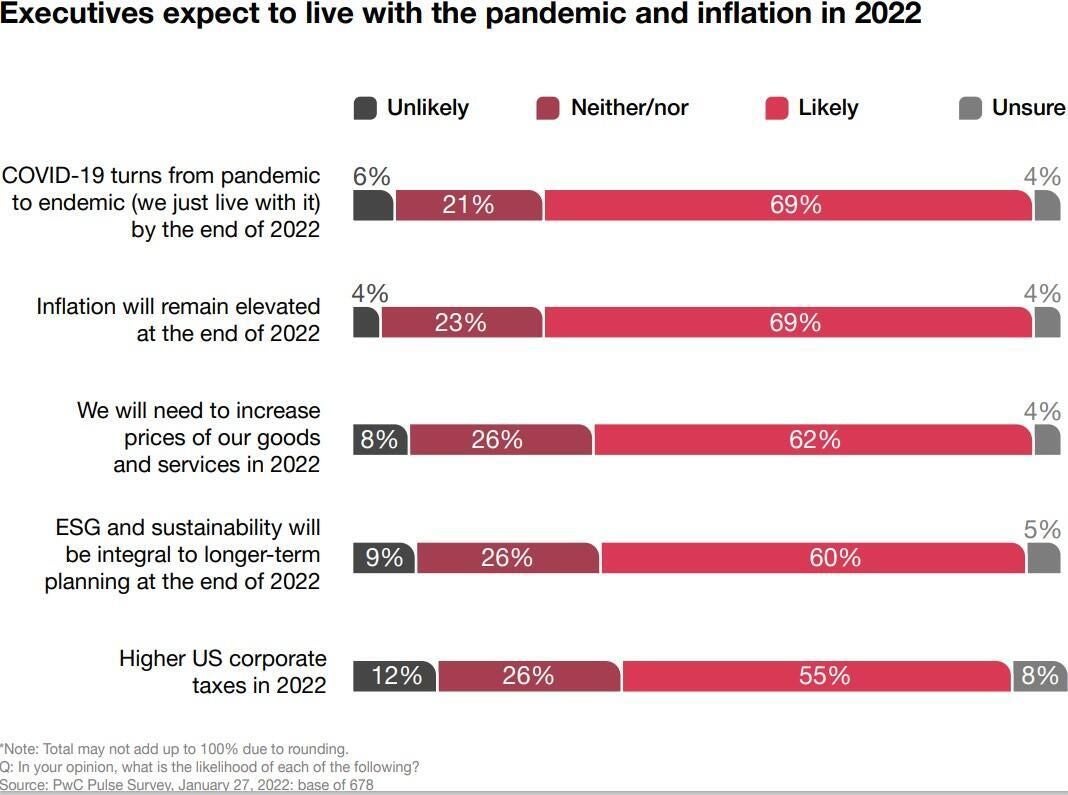
Image: PwC
CEOs are optimistic about growth in 2022 while still expecting continued challenges from COVID, inflation and turnover, according to a new survey from PwC. Executives expect the current high rate of resignations to continue all year with only 31% predicting that hiring will be easier by December based on the findings from the latest Pulse Survey.
Board members see people management as a top issue with 73% planning to devote more time to diversity, equity and inclusion work. Companies will continue to rely on hybrid work options, career advancement opportunities, increased pay, permanent remote work and better benefits to keep people from quitting.
“2022 will be an important year for employers to build trust between employers and employees, as they seek to stabilize their teams and position for growth,” said Julia Lamm, PwC workforce transformation principal, in a press release.
“Hiring and retaining talent” is the top priority by 17 points but only 60% plan to “invest a lot” to solve the problem. That is almost equal to the number of respondents planning to invest a lot in digital transformation initiatives.
Lamm said that she has seen companies investing in managers to improve their skills in leading remote teams that can include contract and full-time employees.
“Companies are investing in managers being able to oversee and direct people who are not a straight-line report to them, and to help managers navigate those complexities,” she said.
Tim Ryan, U.S. chair and senior partner said another factor in retention is long-term investment in diversity and employee engagement.
“When this is done well over time, it’s positively affecting turnover rates,” he said. “I recently talked with two companies in the southeast U.S. that are bucking the turnover trend in their industry because of longstanding investments in people.”
SEE: Why a jungle gym is better than a corporate ladder
Lamm also said that companies can’t “buy their way out” of the turnover issue only by increasing wages.
“Companies are looking internally to develop talents as well and thinking about how to build culture virtually and create mentoring opportunities,” she said.
The ongoing pandemic and vaccine mandates
Most executives in the survey think COVID-19 will become “something businesses and society will have to live with” in the coming year. The survey was conducted before the Supreme Court’s decision that OSHA does not have the authority to require vaccination at large employers. At the time, 33% of respondents require vaccination for employees working in person and will continue to do so. A smaller group–23%–require vaccination now but said this rule may be lifted in the future. The smallest group at 16% have dropped the requirement “in response to labor shortages.”
Ryan said that companies can build trust with employees by being transparent and clearly communicating COVID policies, whatever they may be.
“CEOs figured out quickly that they can’t make everyone happy but they can explain what, why and how you’re doing it, especially when you’re pivoting,” he said. “Without a doubt this is a reflection of how companies treat their employees, and it’s an opportunity to build trust or erode it.”
Dealing with inflation
A majority of respondents expect inflation to continue through the year and a similarly sized group (62%) expects to raise prices for goods and services in 2022 as well.
Neil Dhar, vice chair and consulting solutions co-leader, said addressing this challenge as well as supply-chain issues requires executives to work together across business units.
“Many business leaders are dealing with this for the first time, which means they’re all learning together how to manage through this,” he said. “It is demanding increased attention and new skills from these leaders.”
Fifty-five percent of respondents expect higher corporate tax rates in the U.S. as well. Ken Kuykendall, U.S. tax leader at PwC, said the survey found that 93% of CIOs seek to align digital strategies with tax strategies.
SEE: IT pros say privacy regulations are more helpful than harmful
“Forty-three percent of these leaders are considering accelerating digital transformation initiatives in response to global tax changes,” he said.
He recommended that tax professionals have a seat at the executive table to deal with new and expected regulations.
“The survey showed that 70% of CIOs may be bringing in tax leaders too late for them to add value,” he said.
Concerns in 2022
PwC analysts recommend watching for these trends in the coming year:
- Labor costs will have the strongest impact on corporate margins in 2022
- Inflation concerns will affect fiscal and monetary policy
- Companies will face evolving global data and privacy regulations
PwC conducted the survey from Jan. 10 to Jan. 14, 2022, which included 678 U.S. executives comprised mainly of CFOs and finance leaders (19%), CHROs and human capital leaders (14%), tax leaders (14%), risk management leaders, including CROs, CAEs and CISOs (14%), COOs and operations leaders (12%), CIOs, CTOs and technology leaders (15%) and corporate board directors (12%). Respondents were from public and private companies in six sectors: industrial products (26%), consumer markets (24%), financial services (23%), technology, media and telecom (14%), health industries (6%), energy and utilities (5%).
